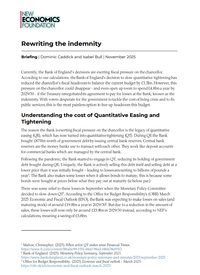Rewriting the indemnity
The need for a new agreement between the Treasury and the Bank of England
19 November 2025
Currently, the Bank of England’s decisions are exerting fiscal pressure on the chancellor. According to our calculations, the Bank of England’s decision to slow quantitative tightening has reduced the chancellor’s fiscal headroom to balance the current budget by £1.5bn. However, this pressure on the chancellor could disappear — and even open up room to spend £4.8bn a year by 2029/30 — if the Treasury renegotiated its agreement to pay for losses at the Bank, known as the indemnity. With voters desperate for the government to tackle the cost of living crisis and to fix public services, this is the most painless option to free up headroom this budget.
Such a policy would be vital to building public confidence in the budget and help the Treasury position its choices as “fair”. If taxes are to go up or public spending is to be cut, it’s untenable to continue paying the Bank for funds it transfers directly to the banking sector when it pays interest on reserves. The Treasury should signal it is willing to consider all other options before putting up taxes or cutting spending.







